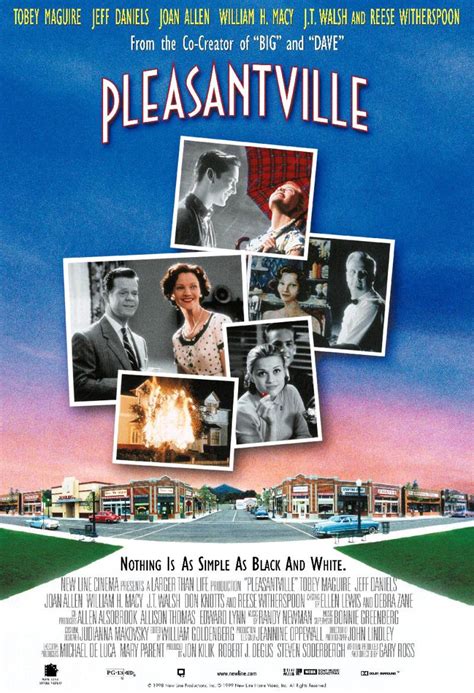Pleasantville

Description:
Pleasantville is a 1998 fantasy comedy-drama film about two siblings who are transported into a black-and-white 1950s TV show where they disrupt the lives of the characters. As the town begins to experience change and color is introduced, the residents must confront their fears and prejudices. The film explores themes of conformity, individuality, and the power of change.Keywords:
Nostalgia, Color, Conformity, Change, Idealism, Societal Norms, Utopia, ParadiseIs Pleasantville a metaphor for racism?
"Pleasantville," directed by Gary Ross, can indeed be interpreted as a metaphor for racism, among other societal issues. The film depicts a 1950s TV town that transforms when two modern siblings are transported into it, bringing change and diversity. As characters experience personal growth, they challenge the town's rigid norms, mirroring the struggles against racial segregation and discrimination. The emerging colors symbolize individuality and the richness of diversity, highlighting the importance of embracing differences and confronting societal prejudices.
What is the main message of Pleasantville?
The main message of "Pleasantville" revolves around the tension between conformity and individuality. The film contrasts the idyllic, 1950s small-town life with the complexities of modern existence. As the characters evolve, they experience emotional growth, creativity, and self-discovery, symbolizing the importance of embracing change and the richness of human experience. Ultimately, "Pleasantville" advocates for the acceptance of diversity and the necessity of facing the complexities of life, suggesting that progress often comes from breaking away from rigid norms.
Is Pleasantville worth watching?
"Pleasantville" is definitely worth watching for its unique blend of comedy, drama, and social commentary. The film, released in 1998, follows two modern siblings who are transported into a 1950s TV show, where they inadvertently introduce change and complexity to the idyllic but superficial world. It explores themes of conformity, personal growth, and the clash between tradition and modernity, all while showcasing stunning visual effects that transition from black-and-white to color. The performances, particularly by Tobey Maguire and Reese Witherspoon, add depth to this thought-provoking story.
Why did Jennifer stay in Pleasantville?
In the movie "Pleasantville," Jennifer, portrayed by Reese Witherspoon, stays in Pleasantville because she becomes captivated by the idyllic, simplistic life and the transformative experiences she encounters. Initially, she is drawn to the town's charm and the opportunity to explore her own identity in a world devoid of modern complexities. As the story unfolds, she grows emotionally and begins to appreciate the deeper meanings of life, love, and personal freedom, which ultimately ties her to the town even as it undergoes significant changes.
Explore More Categories: